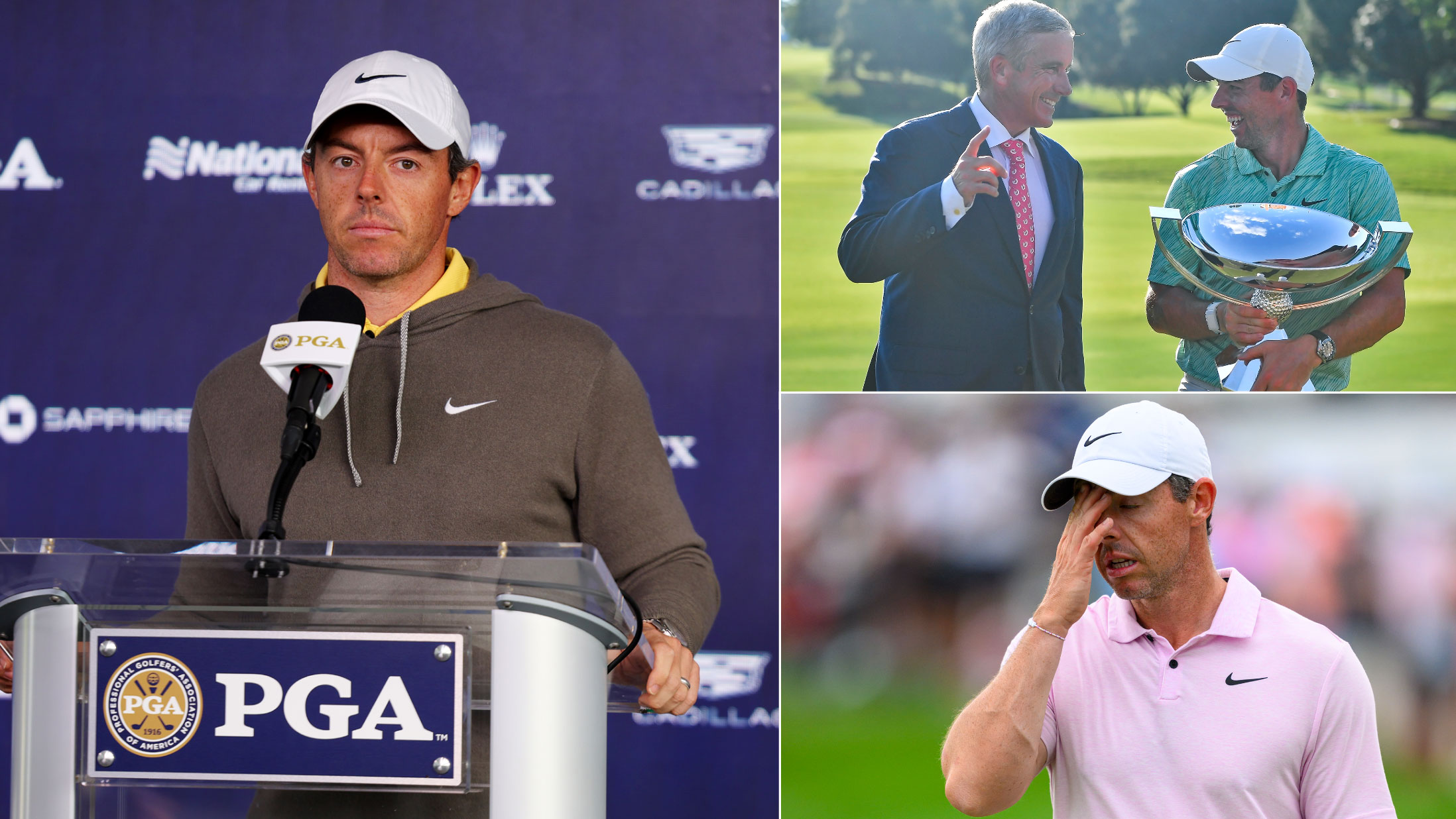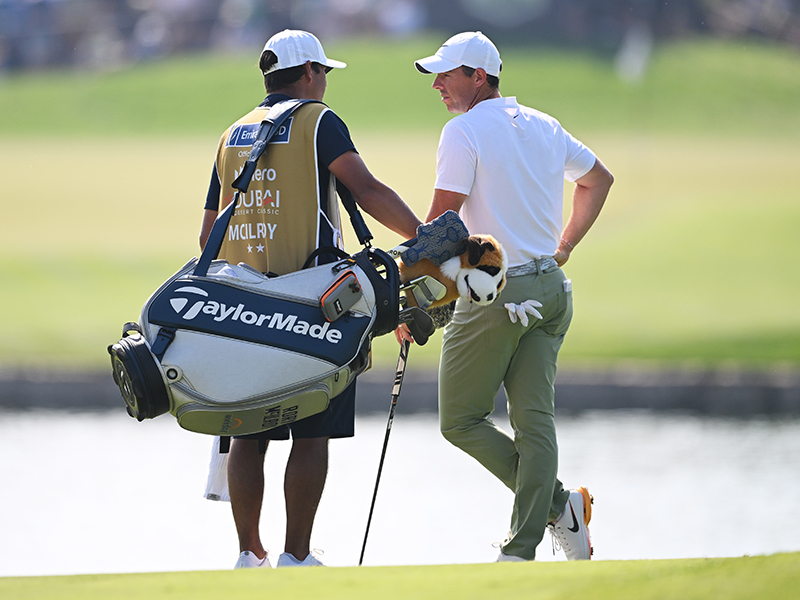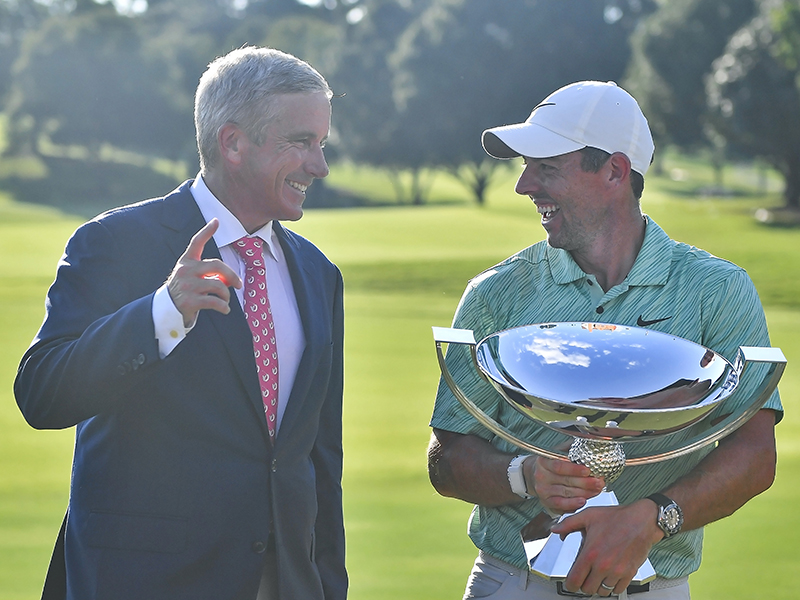
The first episode of Full Swing Season 1 is arguably the weakest of the lot. It follows Jordan Spieth and Justin Thomas, and while there are some humorous moments and noteworthy tidbits, it lacks any sort of explosive impact. The producers were clearly aware of this and their shrewd response was to put their main asset front and centre at the start of Season 2.
Rory McIlroy features prominently throughout, but the first episode is dedicated to him. It positions McIlroy as the face of the PGA Tour during its ongoing battle with LIV Golf and Saudi Arabia’s Public Investment Fund, expertly depicting just how much this altruistic deed has impacted his own game. It’s fascinating to watch such a significant year in the history of men’s professional golf unfold through his eyes.
His honesty, exasperation and raw emotion make for a riveting watch. Other sports documentaries can often be accused of being sterile and sanitised – Amazon’s programmes on Manchester City and Arsenal spring to mind – but there’s not a hint of that here.
Perhaps the most candid moment of the entire season comes following his tie for 7th in the PGA Championship at Oak Hill, when he enters the locker room talking in agitated fashion to his manager Sean O’Flaherty. The microphones pick up him saying: “I s**t myself with left pins. My technique isn’t anywhere near where it used to be.”
A few seconds later, he sits by his locker and continues talking to O’Flaherty and caddie Harry Diamond. “I almost feel like I want to do a complete reboot,” he says.
It’s an incredible moment to be able to witness – a former World No.1 and generational great threatening to rip things down and start again. It’s followed not long after by a refreshingly honest response to Brooks Koepka – who won the event – passing McIlroy’s mark of four Major titles.
“F**k, someone has got more Majors in my era than I have,” he says. “It’s hard not to define myself as one of the best golfers in the world, so when you struggle like that, you feel a little lost.”

The source of his ongoing struggles is plain for all to see: fiercely defending and reshaping the PGA Tour in response to serious and unprecedented competition from LIV Golf and the PIF. Struggles is perhaps overstating it – he still won two times in 2023 – but it’s a relative term. There can be no doubt his game suffered as a result of his staunch advocacy of the PGA Tour.
Some would ask why he put himself in that position, and it’s a fair question. He wasn’t obliged to become the mouthpiece of the tour and work so closely with Jay Monahan as a member of the PGA Tour’s Policy Board. But he did so for two reasons: he recognised his influence and stood up for something he believed in.
Whether you agree with his stance or not, he sacrificed his own game to put his efforts into something he perceived to be more important; he stuck his head above the parapet – and received plenty of scorn by doing so – when it would have been easier to wrap himself in a cloak of apathy. After all, he wouldn’t have been negatively affected by any prospective changes – he’s a box-office star and one of the most talented golfers the game has ever produced. I think he deserves huge credit for spearheading the anti-LIV drive.
“It’s all consuming. It’s a full time job playing golf and having all the other stuff. You get fatigued. I had to ask myself a lot of questions. It’s so difficult,” he says. Then, between the PGA and the US Open, he finds out about the ‘framework agreement’ between the PGA Tour/DP World Tour and the PIF.
“Why did I waste 12 months of my life to fight for something that was always going to come back together again?” he says. It’s hard not to feel intense sympathy for him at this point. He’d clearly been used by the PGA Tour and it’s almost incomprehensible that a man who had done so much for his employer didn’t know the announcement was coming – even though he was aware of conversations between Monahan and Yasir Al-Rumayyan, the governor of the PIF.

He could have flown off the handle, but, as is often the case with McIlroy, his response was considered, measured and eloquent. He didn’t throw his toys out of the pram – as he would have been entitled to do – and instead spoke of feeling like a “sacrificial lamb”. He comes across as weary, resigned and reflective at this point, as though he understands he’s been used as a pawn in a much bigger game.
But there’s no indignation or hostility towards Monahan or the men in blazers – he simply talks about his desire for the game’s best players to come back together. He could have gone on a warpath, but he was smart enough to recognise the futility in that. Not long after, McIlroy is filmed after his painful one-shot loss to Wyndham Clark at the US Open. “I’m going to get one of these f***ing things sooner or later", he says.
Rory McIlroy has always been a journalist’s dream – an all-time great who also thinks deeply about the world and is prepared to voice exactly what he’s thinking and feeling. In the past, that has sometimes landed him in trouble, but in Full Swing Series 2, it’s hard to feel anything other than sympathy and respect. I’ve always held McIlroy in high regard, but my admiration for him has now gone to another level. There’s only one player I want to see donning the Green Jacket come April 14.







